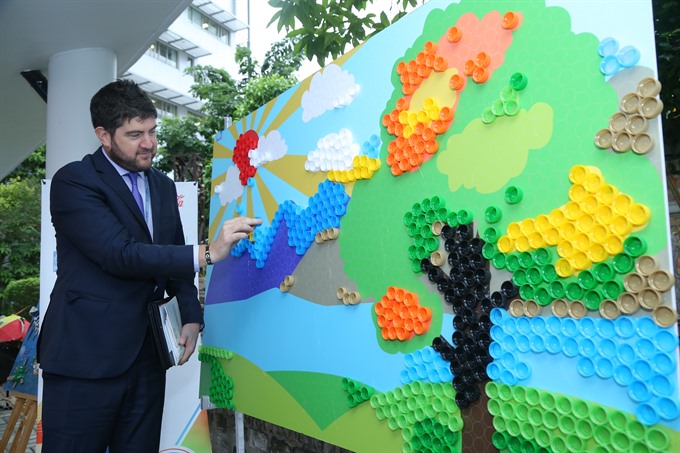 Life & Style
Life & Style

Plastics and solid waste will be turned into artworks with the aim of protecting the environment, as part of the project World without Waste, launched by UNESCO on October 17 in Hà Nội.
 |
| Michael Croft, head of UNESCO Hà Nội Office, joins a painting project created from bottle covers. — Photo courtesy of the UNESCO |
HÀ NỘI — Plastics and solid waste will be turned into artworks with the aim of protecting the environment, as part of the project World without Waste, launched by UNESCO on Wednesday in Hà Nội.
The event is a special occasion to link up all active UN agencies, government bodies and relevant development partners, private sector members, local NGOs and young Vietnamese activists and students through collective action.
During the event, representatives from UNESCO and the British Council shared their new initiatives in recycling and waste management in collaboration with Coca Cola, particularly in tackling plastics pollution from a cultural, educational, creative and artistic point of view.
The partnership, in conjunction with a variety of interventions in scientific research and policy development by the UN in Việt
Within this partnership framework, UNESCO will launch the Art of Recycling Awards, which will call for creative talents in developing artworks using recycled materials.
The award will be open to all individuals or groups of Vietnamese citizens aged 15 years old and above. There are two award categories: one for accomplished artists and the other for students and communities. Participants are encouraged to propose ideas for artistic projects and outdoor display designs to reuse single-use plastics and aluminum waste.
Apart from the issuing of specific awards, the programme will provide financial support for the implementation of the best ideas, with a maximum amount of VNĐ100 million (US$4,300).
UNESCO will take concrete actions at primary tourism destinations in Việt
Michael Croft, head of the UNESCO Hà Nội Office, highlighted the innovative approach in addressing environmental issues.
“In particular, we see the potential to make art out of waste, and to connect people through creativity and imagination. Waste might just be waste, but it might also be artistic inspirations for artists. At the same time, we harness the power of the art to tell a story, to harness its ability to provoke thought and emotion leading to action,” he said.
In tandem with the project implemented by UNESCO, Coca Cola’s partnership with the British Council drives social entrepreneurship and community engagement through the EKOCENTERs programme across Việt
“The British Council is delighted to be in this partnership to develop creative, impactful and sustainable waste management approaches for communities across the country,” said Donna McGowan, country director of the British Council in Việt
“We will draw on our network of Vietnamese and international partners to deliver the project, as well as from our in-depth understanding of the needs of communities across the country. We also have developed a range of approaches, methodologies and curriculums that will be adapted for the needs and contexts of the EKOCENTER and surrounding communities.”
These newly signed partnerships see a wide array of educational programmes, creativity activities and contests as well as strong communications with public and authorised organisations in fostering the awareness and actions for plastic waste management. — VNS




